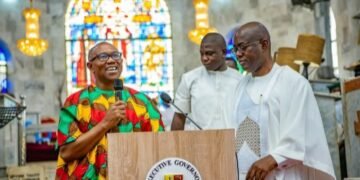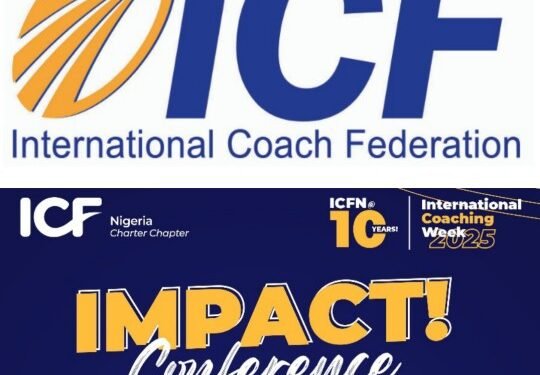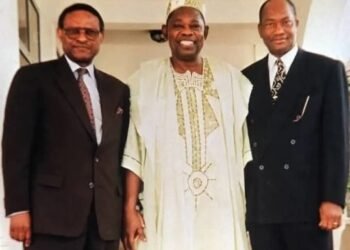“Coaching is like saying, ‘I want to give you the opportunity to be heard and be seen, creating a safe space for a conversation to happen’. In the course of coaching, sometimes there can be silence and we will give everyone the opportunity to enjoy the silence.”
The International Coaching Federation Nigeria Charter Chapter (ICFN) of the International Coaching Federation (ICF) marked its 10th anniversary with a week-long International Coaching Week (ICW) 2025 which started on Monday, 12 May.
ICFN is the first ICF chapter in West Africa, established in January 2015 and formally launched in May 2015. The other two charter chapters are in South Africa and Ghana. ICFN was founded by a group of passionate coaching professionals, to advance professional coaching in Nigeria and the region.
ICFN promotes high standards, ethics, and credibility in coaching, aligning with the ICF global mission to make coaching integral to the society. It offers resources, networking, and professional development opportunities, hosts events like workshops and pro bono coaching during ICW, and supports coaches in transforming lives through impactful coaching practices.
Starting with 10 members at inception, ICFN currently have over 100 members, 46 of which hold a Credential Badge categorised under MCC, PCC, ACC.
ICW is an annual, week-long global celebration of professional coaching, typically held in May. ICW 2025 was scheduled for May 12–18. It was initiated in 1999 by ICF to educate the public about the value of coaching, highlight its transformative impact, and promote its benefits for individuals and organisations.
During ICW, coaches worldwide host events like webinars, workshops, panel discussions, public coaching demonstrations, and pro bono sessions to showcase how coaching unlocks potential, fosters growth, and inspires positive change. The week encourages participation from coaches, clients, and those curious about coaching, fostering connections and raising awareness of the profession’s role in personal and professional development.

The ICW 2025 was celebrated with a conference, tagged “A Decade of Coaching Impact,” held at the Alliance Francaise, Mike Adenuga Centre, Ikoyi, Lagos, on Tuesday.
Dr Tunde Reis (OON), a retired Brigadier-General from the Nigerian Army, was the Keynote Speaker, while Samson Umurhurhu (PCC), Dr Mirian Kene Kachikwu (PCC), Femi Odelusi (PCC) and Linda Uneze (ACC) – all members of ICFN – were panelists, respectively.
Speaking on Innovative Leadership: Coaching As A Catalyst For Transformation, Dr Tunde Reis talked on the essence of innovative leadership, noting that innovative leaders are set apart by vision and empowering others; unlocking potentials by developing team strengths and creation of curiosity culture to foster exploration and learning.
Reis, Founder and Chairman of First World Communities Limited and First World Ventures Limited (UK), said innovation has become imperative because of rapid change in a Volatile, Uncertain, Complex and Ambiguous (VUCA) World; a world which is constantly demanding continuous innovation, collapse of the old leadership epitomised by “command” and “control”, new needs engendered by agility, collaboration and diverse perspectives, thus the need for coaching as “a powerful force for innovation.”
He further said cultivating collective intelligence and collaboration entails lessons from innovation stories; facilitating dialogue and valuing diverse viewpoints; helping teams co-create solutions; moving beyond a top-down approach; and fostering a sense of collective responsibility for innovation.
Reis averred that coaching can drive innovation by creating a safe and supportive space; exploring challenges and identifying strengths; developing solutions through empowerment; asking incisive questions to spark new thinking; moving beyond providing ready-made answers to the higher realm of encouraging discovery; focusing on learning, development and continuous improvement; seeing setbacks not as failure but as opportunities for growth; and cultivating adaptability and resilience for navigating the uncertainties of innovation.
The retired top military officer was also of the conviction that innovation is majorly driven by empathy and psychological safety, noting that every other human endeavours are under the influence of the two factors.
For Reis, developing innovative leadership requires leading with curiosity and empathy, vis-a-vis leaders reflecting on their own assumptions; actively seeking feedback and continuously learning; becoming more adaptable and visionary; leading with curiosity; empowering with empathy and inspiring collaboration.
Dr Reis described himself as BBC (Born Before Computer) and cited himself as an example of a leader who is constantly learning technology from his own biological children. He concluded that “innovative leadership is a continuous evolution,” adding that “coaching provides a powerful roadmap,” “moving towards leadership that asks incisive questions” and “empowering others to find their own solutions” in a bid to collectively shape “a more innovative and impactful future.”

Newscoven.com was on ground at the ICW 2025, in the quest to find answers to questions bothering on the essence of coaching, its imperatives and usefulness to individuals, corporate entities and even leaders occupying the public space. Some prominent members of the ICFN who spoke exclusively, not only provided answers to the questions, but also provided deep insights into the activities and impacts of the ICF, Nigeria Charter Chapter, a decade after it came into existence.
For Akanimo Ekong, ICF President, Nigeria Charter Chapter, ICFN has been faring well, 10 years after it was formed in the country. “We are in 2025; in 2015, the founding fathers and women who started were about five coaches who advanced to professional coaching. Today, we are 100plus strong.
“I am very proud of our achievements so far, and for various reasons, including the fact that a lot of people use the word, “coaching”, loosely. Anybody can just attend a one-day training and say ‘I am a coach’.
“But we belong to ICF which is the only standard in coaching. In over 140 countries, there are 62,000-member strong and they take coaching very seriously. You go through a very rigorous training programme.
“It is not a one-day or one-week programme. You should have used, at least, 125 hours of training and, after that, in some cases, you must have put some 500 hours of coaching some individuals which they are either paying for or pro bono and then do a serious examination. And there is a lot of ethical guidelines around it.
“Initially, like in most other professions, when we started off, many people will say to is, ‘why do I need a coach? I have come this far; mu business is flourishing’. It took a long time for people to realise that what you got here now might not be able to take you to the next level. One of the richest men in the world, Bill Gates, says ‘everyone needs a coach’. So, everybody needs a coach – everybody needs to find something out which can help you to think through.
“Now, with the growing awareness of ICFN, people are beginning to see the power of coaching. It is now financially rewarding – most of us charge per session or per hour and a client would either pay for six, eight or 10 sessions.
Ugochi Ossai, Vice President, ICFN, also spoke on the journey so far, declaring that “ICFN came at a time when not too many people knew what coaching was all about; they don’t have too many coaches.”
She said: “But ICFN has grown over the years, with the efforts of the people that started it. Publicity was given; we tried to reach out to corporate organisations to sell the benefits of coaching; how can coaching can fast-track even organisational structural goals and plans.
“So, it has been an interesting 10 years and we are happy. We believe that, by the 11th year, if not everybody in Nigeria, most people -80 per cent to 85 per cent – would begin to understand the difference between the basketball coach and the coach.
“This is because of the value we bring to the table; because of how it helps leaders to become a better version of themselves; to become more intentional; more able to inspire trust in their followers and, ultimately, that boils down to the bottom line – how harmony in organisation is effected.”
Femi Odelusi, a Professional Certified Coach (PCC) with ICF, is the Director of Education and Credential Support, ICFN. Speaking on the low awareness on the low level of awareness about ICF and coaching as a profession, he said coaching is probably one of the most misunderstood and mis-contexted professions in the world.
Odelusi, however, said: “An event such as we are having today is the opportunity to bring coaching to the awareness of a lot of people; to demystify some of the misconceptions about coaching.
“Like you said, when people hear about coaching, the first thing they could think about is that it is sports and sporting activities. But coaching, as a profession, is more about humanity. It is more about enabling or empowering people to achieve their personal or professional goals. It is something that requires a lot of ongoing training; not just training to become a coach but you also have to keep on training to maintain your coaching standard.
“From ICF, we have three distinct levels of coaching professionalising; we have the Associate Certified Coach (ACC); we have the Professional Certified Coach (PCC) and we have the Master Certified Coach (MCC).
“The training takes a lot of time. Once you become a trained credential coach, you have to keep working hard. There are the things that all the coaches have in common – we work in service of our coachees (our clients) and their goals are those we get them to achieve.”
Charles Okeibunor, Director of Membership, ICFN, spoke extensively on how receptive the Nigerian society is to the idea, vision and mission of ICF, especially as it related to the contributions of coaching to discovering the human essence in every individual, corporate organisations and leaders in the public space.
“First and foremost, I would not judge the Nigerian public because you cannot really be blamed for what you don’t know. Primarily, I will say the clearer it becomes, the more receptive it is because, at the end of the day, it is about solution – another approach towards problem solving.
“Brian Tracy says if you spend 30 minutes in absolute solitude, you will be able to distill solutions to problems that have built over 30 years. So, you will find, radically few people, except they are sleeping, spend 30 minutes in absolute solitude.
“Coaching is like saying, ‘I want to give you the opportunity to be heard and be seen, creating a safe space for a conversation to happen’. And, in the course of coaching, sometimes there can be silence and we will give everyone the opportunity to enjoy the silence. Nobody is forcing you; nobody is saying why are you not talking, if you decide to be silent.
“Coaching is another approach to problem solving, strategic thinking, resilience, adaptability and adoptability. So, the more the society knows about it, the more receptive it will become. Then, the more they [the people] try it, the more the power of coaching thrives,” he said.
Given the growing awareness of ICFN across the country, it is safe to say that coaching is fast gaining acceptability in the society – among individuals, corporate organisations and leaders in all spheres.
Ekhoe Ame-Ogie, ICFN Programme Director, has this to say on the future and possibilities of coaching: “The future is very bright for ICFN, especially as Nigerians are now embracing coaching. Now, there is a better understanding of what coaching is. The prospects are enormous because organisations, teams, individuals and even the country need coaching – for personal development, leadership development – to achieve those goals.
“What coaching does actually is to help people to be focused. Not only to be focused but also to be resilient about accomplishing their goals and also to ensure accountability. Yes, the prospects are really enormous for us here in Nigeria.






























